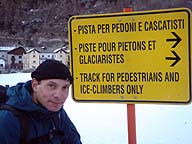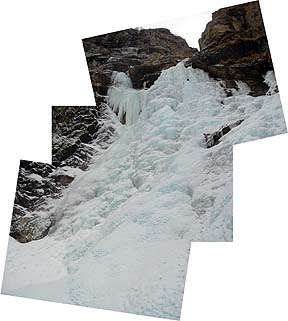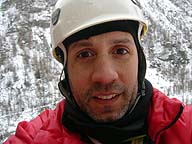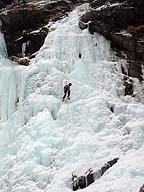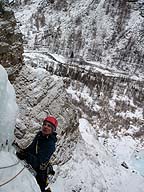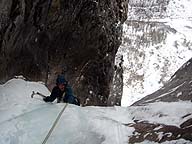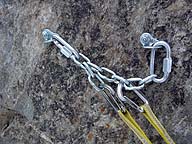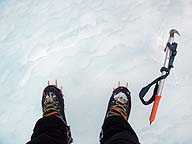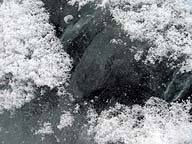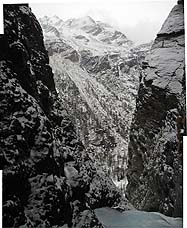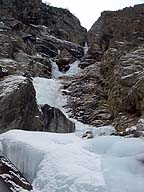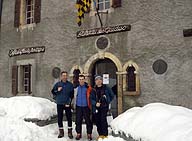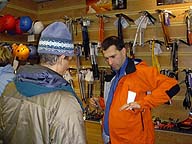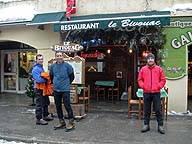|
|||||||||||||||||||||||||||||||||||||||||||||||||||||||||||||||||||||||||||||
| On
Nov 20, 2005, Mat wrote: Pedro, I am heading again this year for an ice climbing trip with 2 friends to Cogne, Valle d'Aosta, Italy. We are coming on Jan 13 and are staying until Jan 22. 9 days of climbing. WI5 - WI6, up to 6 pitch routes. Are you interested in ice climbing with us in Italy? It is just over the French border from Chamonix. We have a car and a large hotel room in a Black Diamond sponsored hotel in Cogne, very cheap, comes with indoor garage, breakfast and gear room for drying. We stayed there last year, all climbers. If you might be interested in joining us let me know. Mat (from the bivi) |
On
Nov 22, 2005, Pedro wrote: Mat, The trip to Cogne sounds like something I would love to do. I am not sure about the WI5 - WI6 because I am pretty sure that I will not have an opportunity to climb before then, but you know me -- I will follow anyone up anything. In any case, I am sure that after two or three days, I will be back in the game. Thanks for thinking of me. Pedro |
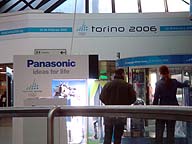 I
scheduled my
flight to arrive at
Turin Citta Di Torino (TRN)
before my American companions. They would arrive via Lufthansa from Frankfurt while I
would arrive from Paris Orly via easyJet.
My round-trip ticket had only cost €50, but I did not read the fine
print in which easyJet states that they only allow its passengers 32
kg of checked-in sporting
goods -- clearly not enough for an alpinist's gear. Excess
baggage was charged at €7.50 per additional kilogram, and as a result
my
excess
baggage cost was €75 -- talk about low
cost European airlines. The Torino airport was in total disarray
with preparations for the 2006
Winter Olympics Games, and looked
more like a place that would be ready in another year, not another
month.
I
scheduled my
flight to arrive at
Turin Citta Di Torino (TRN)
before my American companions. They would arrive via Lufthansa from Frankfurt while I
would arrive from Paris Orly via easyJet.
My round-trip ticket had only cost €50, but I did not read the fine
print in which easyJet states that they only allow its passengers 32
kg of checked-in sporting
goods -- clearly not enough for an alpinist's gear. Excess
baggage was charged at €7.50 per additional kilogram, and as a result
my
excess
baggage cost was €75 -- talk about low
cost European airlines. The Torino airport was in total disarray
with preparations for the 2006
Winter Olympics Games, and looked
more like a place that would be ready in another year, not another
month.Mat --a New Yorker TV
production manager/educator-- arrived accompanied by Mehrdad
--an Iranian naturalized American who works as an IT specialist in
Northern California-- and Karen --an Armenian Russian
naturalized
American who works for the financial industry in San Francisco. As we
stood there surrounded by our baggage, we all
had the same passport but represented four different ethnicities,
spoke five languages (none of them Italian) with
four different accents, had abandoned four prominent churches, and had
enough
advanced education and trivia knowledge stored in our brains to
increase
the average IQ of West Virginia if that would had been our destination.
Clearly, the best that America has to offer.
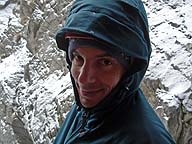 |
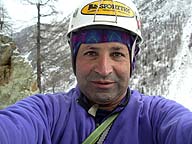 |
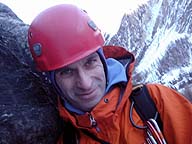 |
||
| Mat |
Mehrdad |
Karen |
After overcoming our
first clear obstacle --renting a big enough car in
a nation of fast micro-cars-- we were on our way to Aosta, 115
km away. At Aosta we visited the local alpine gear
store where I learned about the territorial nature of the climbing
equipment
industry in Europe; no Petzl
in
Italy, no Grivel
in France. After a good
pasta dinner at a local restaurant, we continued towards Epinel and the
comfort of
the Black
Diamond Test Center.
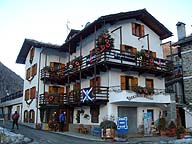 The BD
Test Center
exceeds any climber accommodations that I have seen
(even Joe's Bivi with its new toilets). The rooms are
equipped with a full kitchen, nice bath, comfortable beds, and
satellite
TV (BTW, have you ever seen the Persian Music Channel? -- is like
Britney Spears but with the seals off). For an
additional €3.0 the BD Test Center will provide you with a great
breakfast (although do
not expect to get it in time for an alpine start) and at no additional
cost you can test-drive the
latest gear from Black
Diamond and Kayland
boots. And to
top everything, the Test Center has a large indoor garage that is a
blessing, especially on those very cold days. (A note
of
caution: bring
your own towels -- the ones provided are not much better than napkins.)
As it turned out, we had a one person room while the other housed
three people, but this proved advantageous given Mat's snoring problem.
The BD
Test Center
exceeds any climber accommodations that I have seen
(even Joe's Bivi with its new toilets). The rooms are
equipped with a full kitchen, nice bath, comfortable beds, and
satellite
TV (BTW, have you ever seen the Persian Music Channel? -- is like
Britney Spears but with the seals off). For an
additional €3.0 the BD Test Center will provide you with a great
breakfast (although do
not expect to get it in time for an alpine start) and at no additional
cost you can test-drive the
latest gear from Black
Diamond and Kayland
boots. And to
top everything, the Test Center has a large indoor garage that is a
blessing, especially on those very cold days. (A note
of
caution: bring
your own towels -- the ones provided are not much better than napkins.)
As it turned out, we had a one person room while the other housed
three people, but this proved advantageous given Mat's snoring problem.
Saturday morning we went in search of a warm-up climb in the town of Lillaz. The Cascate di Lillaz (3+) is a beautiful icefall that forms with a hollow core and is only 5 minutes walk from the parking lot in town. As a consequence, this cascade and its neighbors are described by ready2climb.com as "overfrequented". Upon arrival, Karen and Mehrdad busied themselves with Lillaz, while Mat and I explored a short flow to its right that led to the top-rope anchor of a dry-tool problem worth exploring.
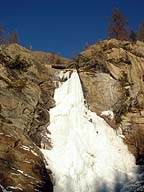 |
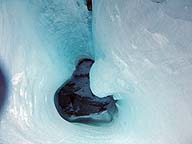 |
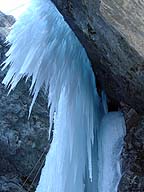 |
||
| Cascate di Lillaz (3+) | ice pipe at the heart of the Cascate di Lillaz |
ice curtain over dry-tool problem |
At the problem, Mat
showed his years of experience in climbing Adirondacks'
thin
ice by climbing ever higher the
overhanging wall; I
could not keep up. But being the first day out, we soon burned out and
decided, on this coldest of days, to go in search of a sunny spot at
the
hikers trail. As we hiked down to join Mehrdad
and Karen, a climber fell from a short
easy climb, hit the deck
(i.e., floor) and bounced off the
ice. Without hesitation, he restarted the lead propelled by the
adrenaline
generated during the fall. The adrenaline also made him shake
uncontrollably and his crampons continuously ripped off
the ice while his tools did not stick regardless of how hard he
tried. 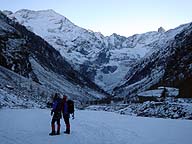 Worse,
his belayer, a rookie skinny girl, was not anchored to anything -- if
this guy fell off from higher
this time, he would drag her down the waterfall to her death.
Worse,
his belayer, a rookie skinny girl, was not anchored to anything -- if
this guy fell off from higher
this time, he would drag her down the waterfall to her death.
Meanwhile, another weirdo came walking down the waterfall without crampons -- not a very advisable practice. Sure enough he slid off and went down the cascade. As I looked in horror, he was able to hold on to the thinnest of twigs just before sliding off to his death. In the meantime, our climbing "friend" tried in vane to get a dull screw started. What the hell was going on with these people? Shaking my head in disbelief, I suggested that we leave before having to spend the rest of the afternoon in a rescue operation. And so, we spent the afternoon scouting the icefalls in the Valeille drainage, which we found had been baked off (i.e., melted away) by the sun.
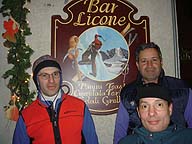 That evening we
relaxed at the Bar Licone
--Cogne local climbing bar-- and had the
best dinner at the Ristorante
Taverna Lou Ressignon, located at the end of the town's main
drag.
That evening we
relaxed at the Bar Licone
--Cogne local climbing bar-- and had the
best dinner at the Ristorante
Taverna Lou Ressignon, located at the end of the town's main
drag.
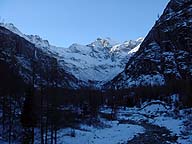 Sunday we visited Valnontey. Three and
a half kilometers
into the drainage from the trailhead, Mehrdad
and Karen started climbing the opening pitch of Patri Left (II, 4) while Mat and I
hiked a little further to climb Acheronte
(II, 3) -- both climbs facing north-west on
the right side of the drainage.
Sunday we visited Valnontey. Three and
a half kilometers
into the drainage from the trailhead, Mehrdad
and Karen started climbing the opening pitch of Patri Left (II, 4) while Mat and I
hiked a little further to climb Acheronte
(II, 3) -- both climbs facing north-west on
the right side of the drainage.
Acheronte simply goes on forever; there is no other way to describe it. After the initial vertical pitch (60 mH), the climb becomes a endless series of low-angle rolling steps that lead to an exit chimney -- but the problem is that you never arrive at the chimney. For hours, I ran pitch (i.e., legth of climbing rope) after pitch up the soupy blue tongue of ice as time and energy dwindled but the ice never ended. Finally, at the base of the exit chimney, and with the watch indicating 15:30, we decided to bailout -- a most frustrating decision.
 Worse,
his belayer, a rookie skinny girl, was not anchored to anything -- if
this guy fell off from higher
this time, he would drag her down the waterfall to her death.
Worse,
his belayer, a rookie skinny girl, was not anchored to anything -- if
this guy fell off from higher
this time, he would drag her down the waterfall to her death. Meanwhile, another weirdo came walking down the waterfall without crampons -- not a very advisable practice. Sure enough he slid off and went down the cascade. As I looked in horror, he was able to hold on to the thinnest of twigs just before sliding off to his death. In the meantime, our climbing "friend" tried in vane to get a dull screw started. What the hell was going on with these people? Shaking my head in disbelief, I suggested that we leave before having to spend the rest of the afternoon in a rescue operation. And so, we spent the afternoon scouting the icefalls in the Valeille drainage, which we found had been baked off (i.e., melted away) by the sun.
 That evening we
relaxed at the Bar Licone
--Cogne local climbing bar-- and had the
best dinner at the Ristorante
Taverna Lou Ressignon, located at the end of the town's main
drag.
That evening we
relaxed at the Bar Licone
--Cogne local climbing bar-- and had the
best dinner at the Ristorante
Taverna Lou Ressignon, located at the end of the town's main
drag. Sunday we visited Valnontey. Three and
a half kilometers
into the drainage from the trailhead, Mehrdad
and Karen started climbing the opening pitch of Patri Left (II, 4) while Mat and I
hiked a little further to climb Acheronte
(II, 3) -- both climbs facing north-west on
the right side of the drainage.
Sunday we visited Valnontey. Three and
a half kilometers
into the drainage from the trailhead, Mehrdad
and Karen started climbing the opening pitch of Patri Left (II, 4) while Mat and I
hiked a little further to climb Acheronte
(II, 3) -- both climbs facing north-west on
the right side of the drainage. Acheronte simply goes on forever; there is no other way to describe it. After the initial vertical pitch (60 mH), the climb becomes a endless series of low-angle rolling steps that lead to an exit chimney -- but the problem is that you never arrive at the chimney. For hours, I ran pitch (i.e., legth of climbing rope) after pitch up the soupy blue tongue of ice as time and energy dwindled but the ice never ended. Finally, at the base of the exit chimney, and with the watch indicating 15:30, we decided to bailout -- a most frustrating decision.
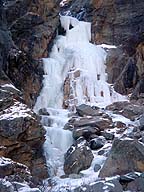 |
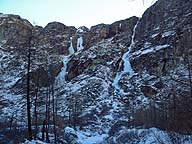 |
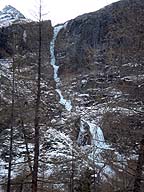 |
||
| climbers
on the opening pitch of Patri |
Patri (Left & Right -- image's left side) and Acheronte
(right) |
Acheronte |
||
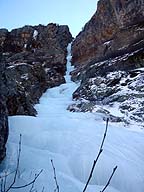 |
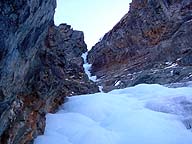 |
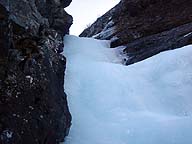 |
||
| Acheronte:
the never-ending story... |
||||
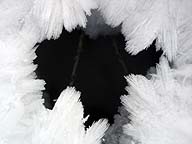 Dusk
came as we finished the last rappel and arrived at the safety of the
scree; the decision to
bailout had been the correct one. Karen and Mehrdad waited for
us by the scree and with the help of our headlamps we started the
arduous task of
crossing the buttress back into Patri to recover our packs. Halfway
there, I noticed that I had dropped one of my piolets (i.e., alpine climbing
tools) --a disaster this
early in the trip-- so I went back for it, but never found it. In the
dark, tired and frustrated, we made our way back to the town of
Valnontey where our rental car would not start because the diesel had
frozen in the fuel line. Can you say suck! To our rescue came Andrea
& Stefano Herren, owners of the Hotel
Restaurant La Barme and Camping Lo Stambecco, who
provided
us with dinner, allowed our car to stay in their indoor
garage during the night, and drove us back to the Test Center -- really
nice people.
Dusk
came as we finished the last rappel and arrived at the safety of the
scree; the decision to
bailout had been the correct one. Karen and Mehrdad waited for
us by the scree and with the help of our headlamps we started the
arduous task of
crossing the buttress back into Patri to recover our packs. Halfway
there, I noticed that I had dropped one of my piolets (i.e., alpine climbing
tools) --a disaster this
early in the trip-- so I went back for it, but never found it. In the
dark, tired and frustrated, we made our way back to the town of
Valnontey where our rental car would not start because the diesel had
frozen in the fuel line. Can you say suck! To our rescue came Andrea
& Stefano Herren, owners of the Hotel
Restaurant La Barme and Camping Lo Stambecco, who
provided
us with dinner, allowed our car to stay in their indoor
garage during the night, and drove us back to the Test Center -- really
nice people.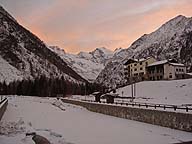 Monday
morning, I asked Rafael (the operator of the Test Center) to drive us
back to
Valnontey to get our car. There, reality hit hard when the car would
not start as it was still too cold. With the aid of Andrea
Herren (who was very busy attending to her little boy),
we were able to secure a tow truck that would
bring our rental car to Aosta. While Karen and Mehrdad attended to the
car, Mat
and I hiked back to the base of Acheronte in search of my lost piolet.
After an
hour of searching, and just as I had given up all hope, Mat spotted the
leash of the tool -- life was good. Meanwhile, the car was placed in a
heated garage and allowed to thaw. Mehrdad and Karen pumped 1/2 a tank
of
the Cogne diesel formulation --which has a lower freezing point-- and
returned to Valnontey for us. But
by
the time they we got back, the day was over and the sad part was
that
we felt more tired than if we had climbed.
Monday
morning, I asked Rafael (the operator of the Test Center) to drive us
back to
Valnontey to get our car. There, reality hit hard when the car would
not start as it was still too cold. With the aid of Andrea
Herren (who was very busy attending to her little boy),
we were able to secure a tow truck that would
bring our rental car to Aosta. While Karen and Mehrdad attended to the
car, Mat
and I hiked back to the base of Acheronte in search of my lost piolet.
After an
hour of searching, and just as I had given up all hope, Mat spotted the
leash of the tool -- life was good. Meanwhile, the car was placed in a
heated garage and allowed to thaw. Mehrdad and Karen pumped 1/2 a tank
of
the Cogne diesel formulation --which has a lower freezing point-- and
returned to Valnontey for us. But
by
the time they we got back, the day was over and the sad part was
that
we felt more tired than if we had climbed.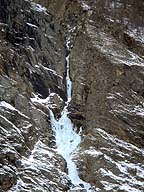 Tuesday,
we felt
the need to even the score with Lady Luck, and so we returned to
Valnontey
for
more. Karen and Mehrdad tackled some of the climbs in the left
side of the drainage near town, while Mat and I went in search of a
climb
that had intrigued our imagination during the last two days -- Benedetto Virus (3).
Tuesday,
we felt
the need to even the score with Lady Luck, and so we returned to
Valnontey
for
more. Karen and Mehrdad tackled some of the climbs in the left
side of the drainage near town, while Mat and I went in search of a
climb
that had intrigued our imagination during the last two days -- Benedetto Virus (3).From the trail, the choke stone pitch appeared to be the crux (i.e., most difficult section) of the climb -- wrong! The first pitch was the killer. The climb was virgin (i.e., no one had climbed it before) and the ice was in very poor condition. Dinner-plate after dinner-plate threatened at ripping off the placement of my other alpine tool (a dinner-plate results when a layer of snow is trapped between to layers of ice leading to a very fragile structure in the icefall). At the top of the pitch I exited left into a hanging belay station under a rock roof where you could see the running water under the icefall. As soon as Mat arrived at the belay, I restarted the climbing, at times breaking through the ice and creating small jets of water that made frozen cables out of our ropes. From the amphitheater midway up the climb, the chimney did not look difficult and we decided to continue. What a great climb!
Our plans for the week
included a visit to Chamonix
--the birthplace of alpinism-- and on Wednesday we drove there. First
we traveled back to Aosta where we took
the A5 in the direction of Courmayeur. There, we took the Mont Blanc
tunnel and voilà,
we were
back in France. What we did not anticipate is how big the
Mont Blanc
Massive really is. It is big enough to hold the
weather on one side of the range and so, by doing the 11 km crossing,
we
went from sunny Italy to stormy France.
In Chamonix we visited all the mandatory places: the Maison de la Montagne, Snell Sports (the greatest climbing store I have ever seen -- yes, bigger than Neptune), and even posed in front of the restaurant le Bivouac. At Snell Sports, Mat acquired a pair of Petzl Nomics, which he had been eyeing for weeks, and we bought a gamut of other climbing equipment (all tax free!).
In Chamonix we visited all the mandatory places: the Maison de la Montagne, Snell Sports (the greatest climbing store I have ever seen -- yes, bigger than Neptune), and even posed in front of the restaurant le Bivouac. At Snell Sports, Mat acquired a pair of Petzl Nomics, which he had been eyeing for weeks, and we bought a gamut of other climbing equipment (all tax free!).
|
|
|
All that tourism made us
feel like climbing and so we went in
search of icefalls. In vane
we looked and looked for the roadside climbs that a Brit guide had
mentioned back
in Cogne. Finally the car got stuck on
the slippery
uphill of Route des Tissieres,
at the base of the Télésiège du Glacier
des Bossons, and most unreasonably but predictably, my
temper flared up. I demanded to be let
out of the car so I could hike to the icefalls. To his credit, Mehrdad
kept his cool, got the car out of the way of the local bus, and
reminded me that my bad temper was in no way helping the situation.
Frustrated, we tried to leave town, but after not being able to find the customs office at the border (yes, we did not know any better -- read about tax free Europe), we returned to Chamonix to ask how to redeem our tax refund. At that point we resigned ourselves to being tourists for the rest of the day. Later that evening, when we emerged from the Mont-Blanc tunnel into Italy, we were treated to scenes of immense beauty as the clouds mixed with the mountains on the east side of the range.
Frustrated, we tried to leave town, but after not being able to find the customs office at the border (yes, we did not know any better -- read about tax free Europe), we returned to Chamonix to ask how to redeem our tax refund. At that point we resigned ourselves to being tourists for the rest of the day. Later that evening, when we emerged from the Mont-Blanc tunnel into Italy, we were treated to scenes of immense beauty as the clouds mixed with the mountains on the east side of the range.
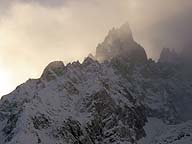 |
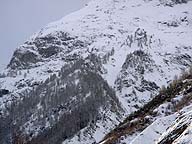 |
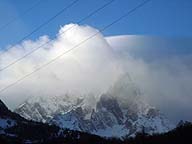 |
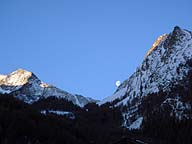 Thursday's
dawn saw us
back at Valnontey where Mat and I tried the climbs on the left
side of the drainage near the trailhead. The first climb was Thoule (II, 3+), which we
shared with a pair of scared climbers. They had
taken the easy way up the headwall, so we tackled the hardest line
available. But just one meter from the top, I was forced to down climb
(yes, I do not like lowering off ice screws) to avoid being hit by the
ice being dropped
by the climber who had diagonally crossed over me. My
decision to down climb proved wise as chunk after chunk of ice
--the size of
toaster ovens-- come down our selected route. Once fire
ceased, I got back up and Mat took the next lead to the belay station
at
the base of
the short pillars. The pillars were treatened
by severe ice fall due to
intense sun
exposure (the climbs in this side face south-east). With the sun
rapidly bringing down the climb and our climbing companions
moving at a
snail's pace, we abandoned the climb, but not before an ice block
--the size of a TV-- flew over my head as I ducked behind
a rock
at the base of the climb.
Thursday's
dawn saw us
back at Valnontey where Mat and I tried the climbs on the left
side of the drainage near the trailhead. The first climb was Thoule (II, 3+), which we
shared with a pair of scared climbers. They had
taken the easy way up the headwall, so we tackled the hardest line
available. But just one meter from the top, I was forced to down climb
(yes, I do not like lowering off ice screws) to avoid being hit by the
ice being dropped
by the climber who had diagonally crossed over me. My
decision to down climb proved wise as chunk after chunk of ice
--the size of
toaster ovens-- come down our selected route. Once fire
ceased, I got back up and Mat took the next lead to the belay station
at
the base of
the short pillars. The pillars were treatened
by severe ice fall due to
intense sun
exposure (the climbs in this side face south-east). With the sun
rapidly bringing down the climb and our climbing companions
moving at a
snail's pace, we abandoned the climb, but not before an ice block
--the size of a TV-- flew over my head as I ducked behind
a rock
at the base of the climb.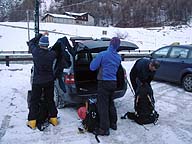 |
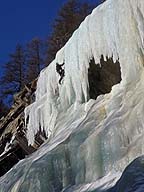 |
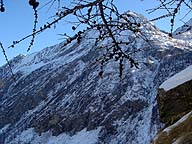 |
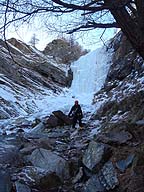 |
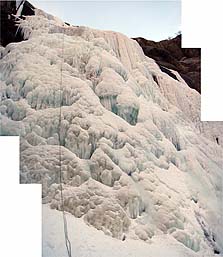 The
second climb of the day was Ingegneria
(3+), which by this time was in the relative safety of shadows.
Mehrdad and Karen met us there, and while they climbed the right side,
Mat suggested that we try a most strange white mushroom route on the
left side.
These mushrooms were the size of small office cubicles and one by one I
worked the problems that they
served -- dug my
way under it, searched for good ice where to place screws and then
climbed straight up through them.
The
second climb of the day was Ingegneria
(3+), which by this time was in the relative safety of shadows.
Mehrdad and Karen met us there, and while they climbed the right side,
Mat suggested that we try a most strange white mushroom route on the
left side.
These mushrooms were the size of small office cubicles and one by one I
worked the problems that they
served -- dug my
way under it, searched for good ice where to place screws and then
climbed straight up through them.Meanwhile, two climbers arrived at the base of the climb. I was too busy with my mushroom mining expedition to notice, but according to Mat, the guys practiced how to place screws at the base of the climb, then fell after 2 feet of climbing, and left with their tails between their legs. (I wonder... Was there a convention of incompetent climbers in town that week?) Mat took the opportunity to try his new Nomics and discovered that climbing leashless is a totally different animal -- a very pumpy one. At the top of the climb, the four of us took advantage of the "comfortable" stance at the rappel station to make dinner plans.
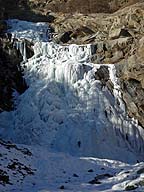 |
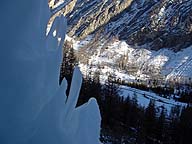 |
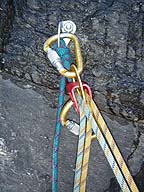 |
| Climber at the base of Ingegneria | the
view from inside a mushroom |
the
rappel station |
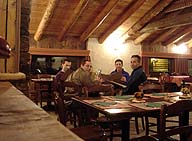 The choice for the evening was the great pizzeria at
Valnontey. Its early 1900's rustic architecture has an ambiance that
makes the dining experience exquisite and its computer-controlled
rotating brick oven creates masterpieces of Italian cuisine. The soupette (not to be confused with
the soupe) is a meal in
itself and the variety of pizzas has something for
everyone. The restaurant has two levels, with the first level being
the hangout for the local teenagers, and the upstairs being a more
serious dinning room for tourists. Our waitress was very friendly, but
she tended to bring more food than we ordered.
The choice for the evening was the great pizzeria at
Valnontey. Its early 1900's rustic architecture has an ambiance that
makes the dining experience exquisite and its computer-controlled
rotating brick oven creates masterpieces of Italian cuisine. The soupette (not to be confused with
the soupe) is a meal in
itself and the variety of pizzas has something for
everyone. The restaurant has two levels, with the first level being
the hangout for the local teenagers, and the upstairs being a more
serious dinning room for tourists. Our waitress was very friendly, but
she tended to bring more food than we ordered.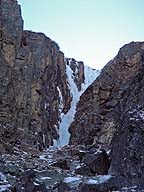 Friday
was the last
day available for serious climbing and we decided to all four climb
together. With the weekend crowds already in town, we
tried a remote climb (4.5 km from the Valnontey trailhead) known as Flash Estivo (III, left 4+, right
3). The approach --in the immortal words of Mat-- "is the worst
f*cking approach I have done in two weeks." It starts
with a bad bushwhack which is followed by an exposed ascent up a steep
talus. Trust me, this is not the place to break a leg.
Friday
was the last
day available for serious climbing and we decided to all four climb
together. With the weekend crowds already in town, we
tried a remote climb (4.5 km from the Valnontey trailhead) known as Flash Estivo (III, left 4+, right
3). The approach --in the immortal words of Mat-- "is the worst
f*cking approach I have done in two weeks." It starts
with a bad bushwhack which is followed by an exposed ascent up a steep
talus. Trust me, this is not the place to break a leg.At the base of the climb, Karen and Mehrdad rapidly racked-up and started climbing as Mat and I fiddled around with gear. By the time we got started, we discovered that the climb is an immense bowling alley where only one party can climb at a time. Mat and I were being bombarded from above and there was little that we could do. Mat led the second pitch into a cave (made by a natural depression in the rock and a curtain of ice dripping from above) where we hid. It was --let's say-- awful! With every hiss, Mat and I huddled together trying to crawl into our helmets. Mehrdad tried to avoid dropping ice from above but there was no way avoid what was happenig to us.
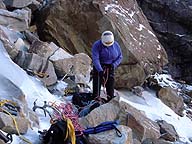 |
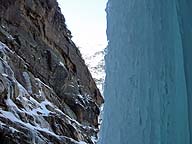 |
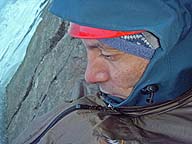 |
| Mehrdad
racking-up |
view
from the ice cave |
waiting
for the sky to fall |
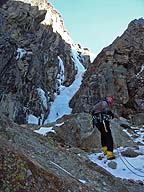 After
much walkie-talkie consulting, we thought best for Karen and Mehrdad to
rappel down from the top of the second pitch while Mat and I retreated.
Mat was not happy. The barrage from above had frazzled his
nerves and he did not think it fair to have worked so hard to get there
and then not climb at all. I, for once, was full of
understanding and empty of anger -- after all this is the way that
alpine climbing sometimes goes. Mat decided he was not walking
down the
hideous talus and
demanded that we rappel. On numerous previous times, it had been me
who has felt
crappie
After
much walkie-talkie consulting, we thought best for Karen and Mehrdad to
rappel down from the top of the second pitch while Mat and I retreated.
Mat was not happy. The barrage from above had frazzled his
nerves and he did not think it fair to have worked so hard to get there
and then not climb at all. I, for once, was full of
understanding and empty of anger -- after all this is the way that
alpine climbing sometimes goes. Mat decided he was not walking
down the
hideous talus and
demanded that we rappel. On numerous previous times, it had been me
who has felt
crappie 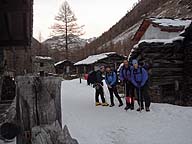 so I completely
understood Mat; but what a difficult task this was. The
ropes would just not pull down over that talus. After about four
rappels, I sweet-talked Mat into down climbing a short section and from
there on he was his old self -- admittedly, a pissed-off version of
himself.
so I completely
understood Mat; but what a difficult task this was. The
ropes would just not pull down over that talus. After about four
rappels, I sweet-talked Mat into down climbing a short section and from
there on he was his old self -- admittedly, a pissed-off version of
himself.Back at the car, we met a group of Chamonix boys waiting for their partners, who had decided to "warm-up" by linking Patri-left (II, 4) and Patri-right-direct (II, 5+) in one day. I imposed on them my poor French and to my surprise, they understood me. They actually answered my questions. My God, I can speak French! That night we had dinner at Lou Ressignon once again.
|
With the
trip almost over, Saturday was dedicated to some roadside climbing at
Lillaz and shopping at Cogne. I had the desire to film myself climbing
out of the ice pipe at the heart
of the Cascate di Lillaz and
so we returned to the scene of the first day.
Prior to leaving the Test Center, Mat and I asked to demo the Kayland's Ice Comp boot/crampon combo. I must admit that they are great; it is like ice climbing in rock shoes. The problem is that they do not offer any warmth. This is a boot for competition or roadside climbing. You need to bring an aditional pair of hiking boots and you can only wear the Kaylands for about a half-hour in normal winter weather. At the cascade, I started by leading through the roof of the ice cave at the center of the icefall. I placed two screws at the base of the cave and proceeded with disregard for what |
happened next
-- easy. Later, after a very pumped
Mat joined me at the belay
(it takes some time to get used to leashless tools), we set to climb
the ice pipe. Since a belayer could not be inside the pipe without
getting
hit by the falling ice, I could not lead the climb. Karen belayed, Mat
filmed, I climbed; the result is shown in
the video above.
(To view it, you will need to download QuickTime if you
have not done it yet.)
That evening when we returned to the Test Center to prepare for the journey back home, Rafael told us of two British climbers (41 year old male and 38 year old female) who died earlier in the day while climbing Acheronte. Apparently, the man decided to simu-climb the low-angle rolling steps while not placing any protection. One of them fell and, as they were tied together, the other was ripped off the climb. He died upon impact, but she lasted long enough to be found by another team in the area. By the time the helicopter arrived, she had died. Having been on that climb just a few days before, the incident put a somber note on an otherwise perfect trip.
I want to thank Karen, Mat, and Mehrdad for inviting me to come along in their trip and for their friendship. I hope we can climb together soon again.
That evening when we returned to the Test Center to prepare for the journey back home, Rafael told us of two British climbers (41 year old male and 38 year old female) who died earlier in the day while climbing Acheronte. Apparently, the man decided to simu-climb the low-angle rolling steps while not placing any protection. One of them fell and, as they were tied together, the other was ripped off the climb. He died upon impact, but she lasted long enough to be found by another team in the area. By the time the helicopter arrived, she had died. Having been on that climb just a few days before, the incident put a somber note on an otherwise perfect trip.
I want to thank Karen, Mat, and Mehrdad for inviting me to come along in their trip and for their friendship. I hope we can climb together soon again.
Guidebook:
François Damilano et Godefroy Perroux, "Cascades, Autour du Mont Blanc -- Tome II: Lillaz (Cogne) Mur Principal,Valeille-Rive Droite-Mur de Lillaz, Valnontey-Rive Gauche", Éditions Ice Connection, 1999. (available at Cordee)
Media Notes:
| Pictures were taken using a Sony DSC-T1 digital camera set @ 5 mega pixels. Photomerges and photo corrections were done using Adobe Photoshop Elements 3.0 for the Mac. High-resolution versions of these images are available upon request. | Video was
taken using a Sony
DSC-T1 digital camera set @ 640x480, standard-resolution. The video
was
then converted to DV format using MPEG
Streamclip 1.5.1, and edited using iMovie HD 5.0.2. Resetting
to 4:3 aspect ratio and conversion to iPod H.264
video format was accomplished using QuickTime 7 Pro for
the Mac. Music: Another
Brick in the Wall, Pt. 3 from the album The
Wall by Pink
Floyd. |
 Pedro
I. Espina© 2006
Pedro
I. Espina© 2006
